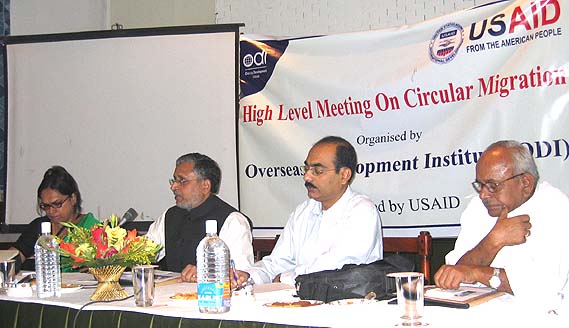| Patna,
(Bihar Times): Migration has long been an integral part of rural livelihood in
Bihar. Although once seen mainly as a distress response to rural crisis, it is
now recognized that migration increases risk but reduces poverty. For a majority
of rural households having one member working outside the village for certain
part of the year is the norm not the exception. There is clear evidence that circular
migration has been increasing. Yet this reality is not reflected in official statistics
or poverty reduction programmes and policies. 
These
were the issues discussed at a high-powered meeting organized by the Overseas
Development Institute in Patna on November 5. The meeting discussed ways for incorporating
migrant concerns into policy in Bihar. Deputy chief minister Sushil Kumar Modi
was the chief guest. The meeting was attended by academics, activists and government
officials. It
was inaugurated with a presentation by Dr Priya Deshingkar of the Overseas Development
Institute. She outlined the characteristics of coping and accumulative migration
streams in the state. She
called for developing models of social protection for the most vulnerable groups
of migrants. This would include types of migration that share many characteristics
with trafficking and bonded labour, that is, debt, underpayment, restricted movement
and belonging to a disadvantaged social group. Ms
Deshingkar stressed the need for developing support packages for more accumulative
kinds of migration (technical, institutional, infrastructure and financial). These
two themes were the main topics of discussions during the meeting. Next was a
presentation by Ajay Kumar, editor of news-portal, BiharTimes.com, who highlighted
the magnitude, costs and current patterns of migration based on his discussions
with development practitioners. Next
was a keynote address by Mr Modi. He thanked ODI for organising a meeting on such
an important issue. He
drew attention towards the issue of remittance mechanisms through formal banks
and post offices. This need to be supplemented with other channels for the most
remote areas. The
deputy chief minister raised the issue of drugging and robbing of poor labourers
in trains on their way back. Besides, women left behind are highly vulnerable
and rape is common but under-reported. Modi
said migrants need support and help and policy recommendations are needed for
both the Bihar government and receiving governments. Flood prone districts have
very high migration rates and many of these migrants migrate within the state.
Araria, according to him, produces highest number of migrants. There is a need
for further study of intrastate migration. He
suggested that ID cards can help but care needs to be taken to prevent its misuse.
He said that the Migrant Labour Act needs further improvement and loopholes should
be identified and addressed. Modi
informed that Bihar had posted a Deputy Labour Commissioner in Delhi for the purpose
of addressing the problems of Bihari migrants in other states. In addition the
government has launched the Pravasi Mazdoor Durghatana Yojana, a scheme to help
labourers in the event of an accident on the job. The state government will soon
organise a two day workshop on the issue of migrant labour. Large
corporate houses are importing skilled labour from other parts of Asia; Bihari
workers could take these jobs if properly trained, he said. A
discussion on child labour chaired by Mr Ram Dev Prasad, chairman of the Bihar
State Child Labour Commission, followed Modi’s speech. ODI
is an independent think tank with more than 30 years of experience of working
in India on a range of issues related to natural resource management and poverty
reduction. It is headquartered in London and has a liaison office in Hyderabad.
Recent projects undertaken by it included a three year project on watershed management,
research on PRIs and natural resource management, livelihood diversification and
labour migration.
Comment |